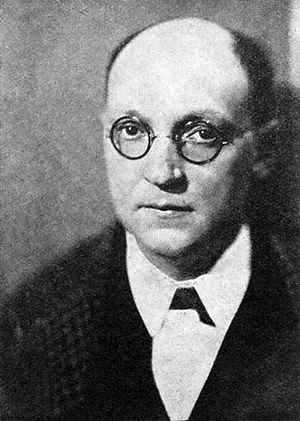Georges Duhamel facts for kids
Quick facts for kids
Georges Duhamel
|
|
|---|---|
 |
|
| Born | 30 June 1884 Paris, France |
| Died | 13 April 1966 (aged 81) Valmondois, France |
| Children | Antoine Duhamel |
| Signature | |
 |
|
Georges Duhamel (born June 30, 1884 – died April 13, 1966) was a famous French writer from Paris. He first trained as a doctor and worked as a surgeon during World War I. Later, he became well-known for his books, especially the series about a character named Salavin, starting with Confession de minuit in 1920. In 1935, he was chosen to be a member of the important Académie française, which is like a special club for French writers and thinkers. He was even nominated for the Nobel Prize in Literature twenty-seven times! Georges Duhamel was also the father of a composer named Antoine Duhamel.
About Georges Duhamel
Georges Duhamel was born in Paris on June 30, 1884. He was the third child in his family. His family often had money troubles because his father's work was not steady. These difficult times when he was young are shown in his famous book Le Notaire du Havre (1933). This book was the first in his Pasquier series, which was a bit like his own life story.
Even though his childhood was sometimes difficult and his family moved often, Georges still finished school in 1902. He wanted to be a doctor, but he also loved books and art very much. He kept working on both his medical studies and his passion for literature.
Between 1906 and 1909, he started an art group called l'Abbaye de Créteil with his friend Charles Vildrac. This group brought together poets, writers, musicians, and painters. From 1912, he became an editor for a famous literary magazine called Mercure de France. Later, in 1935, he took charge of the magazine and its publishing company. He was also chosen to join the French Académie Nationale de Médecine and Académie des Sciences Morales et Politiques in 1937.
When World War I began, Duhamel joined the army and worked as a surgeon for four years. He often worked in very dangerous places. This tough experience gave him ideas for two books that became very popular: Vie des martyrs and Civilization. Civilization even won him the important Prix Goncourt in 1918. After the war, Duhamel focused on writing and speaking up for human values. In 1919, he found two peaceful places in the Val-d'Oise region where he would spend his summers.
In 1935, Duhamel was elected to the Académie française. This is a great honor for a French writer. From 1930 to 1940, he traveled a lot, giving talks in France and other countries. He spoke wonderfully about French language and culture. He also promoted the idea that a good society should be built on kindness and human connection, not just on new technology.
Duhamel believed strongly in peace and working together with people from all countries. During World War II, the German forces banned his books. He was very brave in standing up against the occupation and those who supported it in the Académie française. Later, Charles de Gaulle, a famous French leader, praised Duhamel for his courage.
After the war, Duhamel became the president of the Alliance française. This organization helps spread French culture and language around the world. He helped set up many schools for the Alliance. Georges Duhamel's health started to get worse in 1960, so he did fewer activities. He passed away in Valmondois on April 13, 1966.
Important Books
- Vie des martyrs (1917)
- Civilisation (1918) (Won the Prix Goncourt)
- Vie et Aventures de Salavin (5 books) (1920-1932)
- I. Confession de minuit
- II. Deux hommes
- III. Journal de Salavin
- IV. Le Club des Lyonnais
- V. Tel qu'en lui même
- Scènes de la vie future (1930)
- Chronique des Pasquier (10 books) (1933-1945)
- I. Le Notaire du Havre
- II. Le Jardin des bêtes sauvages
- III. Vue de la terre promise
- IV. La Nuit de la Saint Jean
- V. Le Désert de Bièvre
- VI. Les Maîtres
- VII. Cécile parmi nous
- VIII. Le Combat contre les ombres
- IX. Suzanne et les Jeunes Hommes
- X. La_Passion_de_Joseph_Pasquier
- La Musique consolatrice (1944)
- Lumières sur ma vie (5 books) (These are his memoirs)
See also
 In Spanish: Georges Duhamel para niños
In Spanish: Georges Duhamel para niños
- Unanimism
 | John T. Biggers |
 | Thomas Blackshear |
 | Mark Bradford |
 | Beverly Buchanan |

